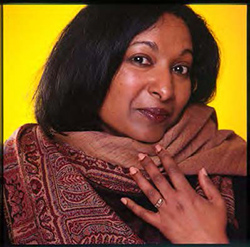Meena Alexander, internationally renowned poet and scholar, spoke at the University on Tuesday, October 16 as part of the Visiting Writers series. A huge crowd filled the Wilson Auditorium with students, faculty and members of the surrounding community.
Alexander, who was raised in India and Sudan, currently lives and works in New York City, though she taught at several universities in India prior to that.
She earned her PhD in romantic literature from Nottingham University at the age of 22. She is currently a distinguished professor involved with the Masters of Fine Arts degree in creative writing program at Hunter College and the English PhD program at the City University of New York graduate center.
According to her website, “She is the author of six volumes of poetry including Illiterate Heart (winner of the PEN Open Book Award), Raw Silk and Quickly Changing River. She is the editor of The Everyman Library’s Indian Love Poems. She has written the acclaimed autobiography Fault Lines (picked by Publishers Weekly as one of the best books of the year) as well as two novels, one of which is Nampally Road (A VLS Editor’s choice).”
She has also been given the 2009 Distinguished Achievement Award in Literature from the South Asian Literary Association.
Not only did she read some of her own work, she discussed her creative process and inspiration, as well as her upbringing, which serves as the focus of some of her poetry.
Michael Thomas, Assistant Dean of the school of Humanities and Social Sciences, feels her colorful life has contributed to her success. “The work and world of poetry… is dependent on the human spirit,” said Thomas. He added that people such as Alexander are vital cultural figures in this- or any- society.
Alexander began with readings from her upcoming manuscript, Birthplace of Buried Stones. She explained that the poem “Question Time” was brought about by someone at a conference asking her, “What use is poetry?” The poem deals not only with poetry as a necessary means of expression, but the conference itself, and how the venue seemed to reflect the dull, unimaginative nature of the question.
A different poem from Raw Silk dealt with the effects of 9/11 and how people sought to “figure out redemption” in its aftermath. Alexander told the audience that she had been one of a very small number of graduate students selected to write for a special event dealing with the incident.
She also read her poems “Closing the Kama Sutra” and “Experimental Geography”. These were followed by her recitation of an elegy she had written for an old friend, which was filled with as much symbolism and imagery as her other works.
Alexander spoke of the various things that are involved with her process, such as how she has a favorite writing spot. She also said that, at times, she’ll gaze at those around her, select one or two people who happen to catch her eye, and begin to imagine what their lives are like. Her writing also draws heavily on cultural influences, including her experience in coming to America.
Though she writes in English, a number of her poems feature text in other languages. Alexander is fluent with English, French and Hindi, among a variety of other languages. Some of her work has commented on language itself, and how each reflects the past of the nation that speaks it. She says that American English has a hidden violence, masking the years of slavery and anger that came with colonization.
A few of the students in attendance had the privilege of requesting that Alexander read specific poems, leading to a recitation of “Raw Silk,” a multi-part poem for which one of her manuscripts was named. In it, she uses vivid imagery, as well as foreign languages, to tell the story of a young girl in a foreign country exploring her passion for literature while living in a time of war.
During the question and answer portion of the event, an audience member asked if Alexander worried that she might confuse the reader by having some lines in other languages. “It doesn’t really matter; there’s a certain lyricality that works,” she responded, adding that the flow of a poem can imply meaning, even if the reader doesn’t understand the words.
Many audience members voiced their perceptions of Alexander’s work. Some felt that her strength derived from her evocative metaphors. Others believed it was the numerous references to her homeland. Some felt that her narrative voice, which was both direct and subtle in equal measure, is the driving force in her poems.
To many, it seemed that the intensity of her diction is what led to her fame, but to Alexander, her poems are a way of life. “The lyric poem allows me [to]… better catch the edginess of things, the sharp nervosity, the flaming, falling buildings. And I think I must work back from the pressure of the present into the past, for that is the only way I will reach into the real,” she said during an interview with Lopamudra Basu.
Courtney Luk, senior English major with a concentration in creative writing, enjoyed being able to hear the poet read her own work. “I like the way she speaks. Her tone really speaks to the content,” said Luk.
Alexander, in discussing poetry in general, explained that it can take her anywhere from one day to several weeks to write a single poem. “There are recipes in India that say, ‘Combine ingredients and then stir constantly for six hours.’ A poem is a little like that,” she said.
She closed the meeting with a final reading from her upcoming manuscript.
Alexander was available for further discussions as well as book signings afterwards, to the delight of many attendees.
Her poetry, regardless of its subject, has the unifying theme of embracing the society around you, since the history and culture you grow up with inevitably shapes who you are and who you will become. Be sure to see the next writer on November 1.




